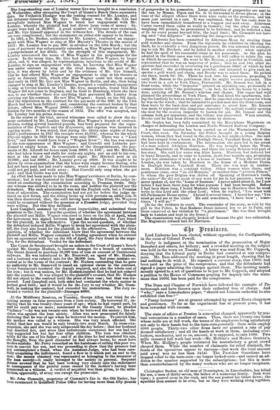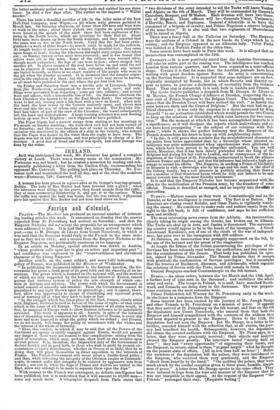4t Vrnuiurts.
Lord Lieburne has been elected, without opposition, for Cardiganshire, in the room of Colonel Powell.
Derby is indignant at the termination of the prosecution of Major Beresferd and others, for bribery; and a crowded meeting on the subject was held in the town on Tuesday. A letter was read from Mr. Coppock, denying that the Liberal party in Derby had connived at any compro- mise, Mr. Bass addressed the meeting at great length, showing that he had nothing to do with it. He repeated a current story, that 1000/. had been paid as the price of the compromise, and that the defendants had signed a paper admitting the charges against them. The meeting unani- mously agreed to a set of questions to be put to Mr. Coppock, and adopted a petition to the Rouse of Commons praying for inquiry into the sta* meat that 10001. has been paid for the compromise.
The Dean and Chapter of Norwich have followed the example of Pe- terborough and have thrown open their cathedral free of charge. And "why," says a Lincolnshire paper, "should not Lincoln cathedral be also exhibited cost free ? "
"Penny-lectures" are at present attempted by several Essex clergymen and gentlemen. So far as the experiment has at present gone, it has been rewarded with success.
The state of affairs at Preston is somewhat changed, apparently by mu- tual concessions in a number of MOOS, Thus, there are twenty-one flags whose mills are at full work, the terms of the employers being satisfactory not only to their hands but to the tiusa-outs generally : these mills employ 6000 people, Thirty-two other firma have not granted a rate of pay deemed satisfactory ; and all the heads at work in them, including over- lookers, mechanics, and so on, amount, it is supposed, to only 1500. Two mills resumed full work last week—Mr. Hollins's and Messrs. Gratrix's. When Mr. Hollins's people reentered his manufactory a great crowd cheered them. While the number of claimants for relief diminish, the funds. of the operatives appear to increase—last week the total amount paid away was no less than 3454/. The Poor-law Guardians have stopped relief to the turn-outs—no longer locked-outs—and caused as ad- dition to the number supported by the subscriptions; but this ie mow than counterbalanced by the many workers who are no longer recipients.
Christopher Barker, an old man of Donnington, in Lincolnshire, has killed his son, a man of thirty-seven, the father of a numerous family. Both were tipsy ; a quarrel arose in the road, and the eon pushed his father down; the squabble then seemed to be over, but as they were walking along together,
the father suddenly pulled out a large clasp-knife and stabbed his son three times : he died a few days after. The verdict on the inquest is " Wilful murder."
There has been a dreadful sacrifice of life in the Arley mine of the Ince Hall Coal Company, near Wigan,—a pit where sixty persons perished in March last. On Saturday afternoon, no fewer than 230 men and boys were at work in the mine ; about three o'clock two reports in quick succession were heard at the mouth of ;the shaft : there had been explosions of fire- damp in the North levels, which are notorious for their foul air. About forty men were drawn up from the South workings, and they reported that the mine was on fire in the North levels. Until this fire had been extin- guished—a work of three hours—no search could be made for the sufferers. At length bodies of miners were able to begin the dreadful task: they came upon heaps of dead ; during the afternoon and night sixty corpses were taken out ; on Sunday twenty-seven more were recovered ; and it was feared that others were yet in the mine. Some of the colliers were rescued alive, though much exhausted ; the lege of one were broken ; others escaped into another pit. In places masses of the roof have fallen in and until the soil can be removed it cannot be known with certainty whether any miners are buried beneath, as there is no exact register of the people who were in the pit when the disaster occurred. It is surmised that the disaster origin- ated in the explosion of a blast ; but the exact truth may never be known, as all must have perished in the spot where the gas first took fire.
On Friday and Saturday there was a terrific gale at Liverpool, blowing from Lthe North-west, accompanied by showers of hail, snow, and rain. Ships were prevented from departing ; some got into collision ; and several were cast ashore, with a lamentable loss of life. On Saturday afternoon the bark Cherokee was known to be on the East Hoyle Bank; two steam-tugs went to her aid, towing each a life-boat with a crew on board ; when near the bank the boat towed by the Victoria suddenly upset, and eleven men were cast into the sea, of whom only one was rescued. The Hoylake life- boat had taken off part of the crew of the Cherokee ; the vessel subsequently left the bank and drifted ashore. A large coasting schooner was seen floating bottom up near New Brighton : crew supposed to have perished.
The Pique frigate had a narrow escape from sinking at her moorings at Plymouth on Sunday morning ; the wash-deck cock had not been turned off on Saturday, and there were fourteen feet of water in the hold before the omission was discovered by the officers of a ship in the vicinity, who noticed that the Pique was deeper in the water than she ought to have been. The frigate was not in full commission, and was principally in charge of a few marines. A good deal of bread and flour was spoilt, and other damage was done by the water.



























 Previous page
Previous page